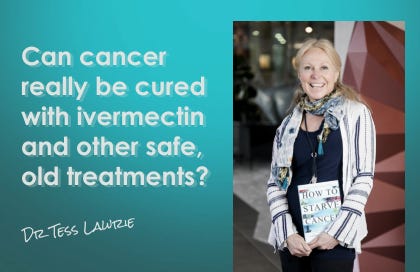As we covered back in December, researchers and oncologists like Professor Angus Dalgleish are seeing a disturbing proliferation of cancers, in particular following Covid injection. Even before the pandemic, the incidence of cancers was increasing and a recent study has found that the occurrence of brain cancer is related to both GDP and mobile phone usage.
To understand the mechanisms behind this, you can watch my interview with Professor Dalgleish here. Today, I want to focus on what on earth we can do about it. To help me, I’m consulting not an oncologist, or a pathologist, but an exceptional woman who became an expert by necessity. She’s called Jane McLelland and her knowledge in this area is worthy of a PhD.
Jane is one of several people I have met in the last three years who are top scientists, just without the long line of initials after their names. Her own Stage IV cancer diagnosis forced her down a path of inquiry and investigation – and this research quite literally saved her life. That was about two decades ago, and she’s been helping others ever since.
I’ll be publishing our full Tess Talks interview this Sunday. In the meantime, I just wanted to share a few things that really struck me about our conversation…
Off-label, safe drugs are a criminally untapped resource
Jane’s strategy for treating cancer is comprehensive and includes what she calls ‘four pillars’:
Establish the best diet.
What, when and how to exercise.
Work out the key supplements to block the dominant pathways.
Understand the potential of certain off-label drugs that are having huge success.
All of those pillars are key, but you can imagine how interested I was to hear about the effectiveness of off-label drugs – including ivermectin. Watch the clip above to hear more from Jane about ivermectin’s cancer-beating properties. In our full conversation, Jane goes into depth about exactly which drugs she has used – and still uses – with great success. She explains it’s all about starving the cancer by blocking all the pathways it uses, not just some. Different cancers use different pathways and so, according to Jane, it’s important to tailor the treatment accordingly.
It is quite telling that it has taken a ‘layperson’ to figure out these off-label treatment protocols. That’s what happens when you’re not stymied by professional pressure and conflicts of interest. When we’re told ‘trust the experts’, perhaps it’s time to recognise that the real experts are often the ones working from kitchen tables, not multi-million dollar research facilities.
What happened to the doctor-patient relationship?
Jane’s own diagnosis and treatment began back in the 1990s and she describes the amazing support she received from her doctors at the time. It seems that when she would suggest a particular drug or protocol, they would be open to the idea, and agreed to let her just try. The doctor-patient relationship was one of mutual respect and trust, with the doctor as the patient’s ally. This now appears so rare.
When the pandemic was at its height, we were inundated with pleas from people who were desperate to get ivermectin to their loved ones in hospital, but who were blocked at every turn. Doctors and hospitals would not even entertain the idea of trying this safe medicine, even when a patient’s prognosis was poor and there was little to lose. In our conversation, I mention one instance where we quite literally helped smuggle ivermectin in a chocolate bar to a woman in intensive care:
Edit: Since YouTube couldn’t resist yet more censorship, here’s the video above on Bitchute.
It makes me wonder: if this pandemic had arrived in the mid-nineties, it might well have been over within a few weeks. I imagine word would have spread that ivermectin, together with other nutraceuticals such as vitamins D, C, quercetin and zinc, were doing the trick and that would have been that. How things have changed!
Conventional treatment is just not good enough
Our conversation also made me reflect on my early work in the cancer wards. There, I became acutely aware of limitations of chemotherapy and radiotherapy, particularly in late stage cancers. Often when life is extended by a month or two, those months are spent battling the side effects of these treatment modalities. I also saw this in my work as a systematic reviewer of treatments for brain tumours: the toxic treatments and experimental drugs offered to cancer sufferers lead to an extremely poor quality of life.
In summary, there is a better way. Jane has such an important and positive message, and I’m so looking forward to sharing our full conversation this Sunday morning.
Please help support our work!
If you enjoy this Substack and have the means, please consider making a donation - all proceeds go to World Council for Health. You can either:
Can’t donate but would like to contribute? We are always looking for volunteers, so please do get in touch!





Share this post